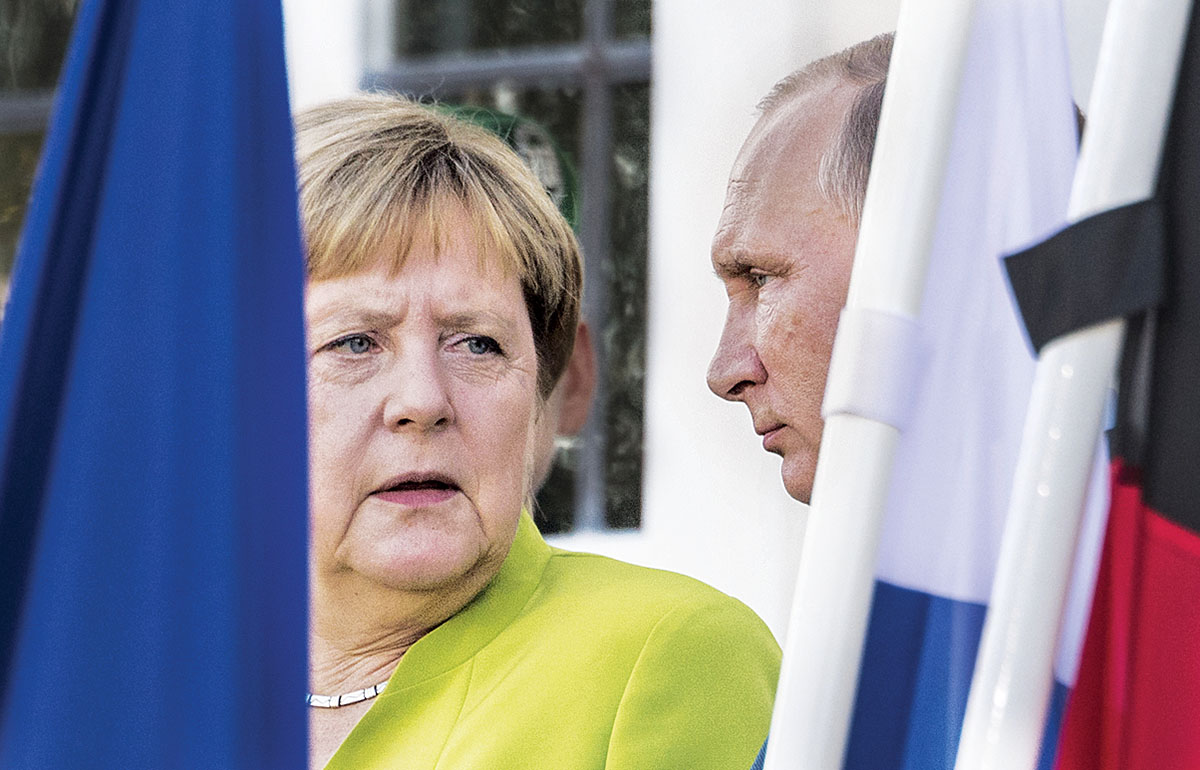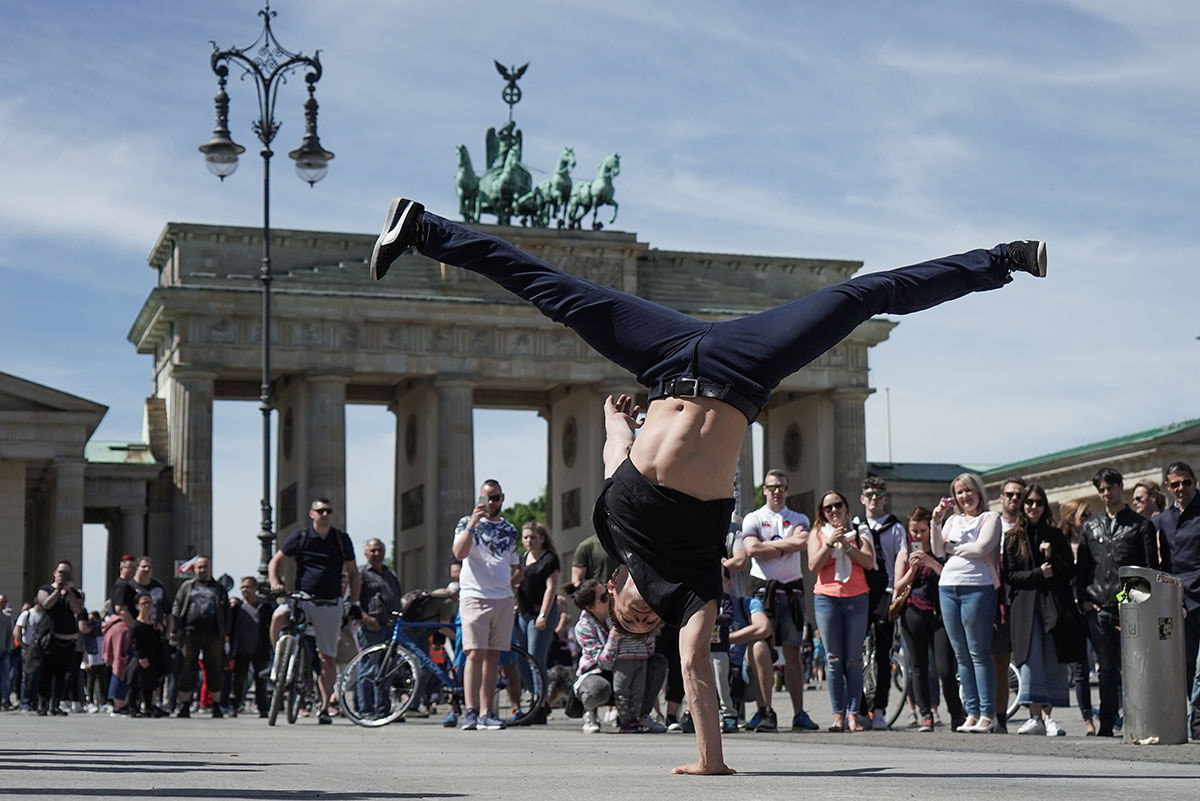A big disagreement between allies over a major energy project is no laughing matter.
Addressing the United Nations General Assembly on Sept. 25, U. S. President Donald Trump criticized Germany for allowing the Nord Stream 2 natural gas pipeline project to go forward.
“Germany will become totally dependent on Russian energy if it does not immediately change course,” he said. “Here in the Western Hemisphere, we are committed to maintaining our independence from the encroachment of expansionist foreign powers.”
But Germany’s U.N. delegation, including Foreign Minister Heiko Maas, appeared amused by Trump’s words, quietly chuckling and smiling at one another.
While countries like Ukraine, the United States, and Poland have long criticized Nord Stream 2 as a Russian geopolitical weapon aimed at Europe, the Germans take a different view.
Although the pipeline is also controversial in Germany, the German authorities believe their hands are tied legally. Meanwhile, politically, Nord Stream 2 has failed to mobilize the kind of opposition necessary to derail the project.
And in many ways, the pipeline’s construction reflects the increasingly complicated economic and political relationship between Berlin and Moscow.
Private actors
It’s not difficult to understand Kyiv’s opposition to Nord Stream 2: the pipeline would bypass Ukraine, costing the country gas transit fees worth at least two percent of its gross domestic product, which was $112 billion in 2017. U.S. critics, on the other hand, view the pipeline as energy infrastructure that will make Germany — and Europe more broadly — hostage to Russian energy, opening the country up to political blackmail by Moscow.
They also believe it will strengthen Moscow’s position on the continent, while undermining Ukraine. But Berlin sees the issue of Russian energy quite differently, according to German energy and political experts. Germany has received Soviet or Russian gas since the 1970s.
As a result, energy ties with Russia — amid good relations and bad — are nothing new to Berlin. And with the brief exception of the 2009 “gas war” between Ukraine and Russia, the country has not experienced any supply interruptions.
As Russian state gas company Gazprom’s top customer, Germany also has leverage over its partner. It has always managed to negotiate a lower price than other European Union or Eastern European states. Secondly, while much discussion of Nord Stream 2 focuses on geopolitics, to the German authorities the pipeline is, first and foremost, a private project driven by economic interests.
Even if it is detrimental to European security, the authorities see little they can do. “The problem that Germany has here… is that there is no ordinary legal regulation that would allow the German state to interfere in private foreign commercial activity,” says Andreas Umland, a German adjunct professor at the Kyiv-Mohyla Academy.
For Germany, Nord Stream 2 makes economic sense. The pipeline will provide relatively cheap gas and will allow Germany to become a major hub for much of Europe’s energy. It also has serious support in Germany’s Mecklenburg-Vorpommern region — where the pipeline will land after crossing the Baltic Sea — because it will create jobs and buoy the local economy.
This local factor is frequently underestimated, says Stefan Meister, director of the Robert Bosch Center think tank. Regional actors play a driving role in both the German federal and political party systems.
“They lobby for this project,” Meister says. “They have impact in their own parties… It’s not so easy for federal politicians at the national level to just refuse this.”
But while many analysts miss this aspect of the Nord Stream puzzle, Meister says Moscow is well aware of it. Russia has focused its lobbying efforts at this level of German politics, using its networks, contacts in the local elite, and even disinformation to drive the project forward.

German Chancellor Angela Merkel and Russian President Vladimir Putin give a statement on Aug. 18 at Schloss Meseberg castle in northeastern Germany, where they met to discuss the conflicts in Syria and Ukraine as well as energy issues. (AFP)
Source of instability
For all its support, Nord Stream 2 has its critics in Germany. In particular, one party, the Greens, has opposed the pipeline on both environmental and geopolitical grounds.
More broadly, however, opposition to the pipeline is not a party issue. “The split is not among parties, but among policy circles,” says Kirsten Westphal, an energy specialist at the German Institute for International and Security Affairs.
“You find the economic wings of parties being in favor, but foreign (policy) and security elite speaking out against the project.” Umland echoes her analysis: all major parties feature politicians who criticize the pipeline as a source of instability in Eastern Europe.
“The mainstream is actually divided in Germany about this,” he says. Those divisions have not been enough to derail the project, but they have resulted in a certain rethinking of the issue by the German leadership.
Previously, Chancellor Angela Merkel defended Nord Stream 2 as a purely commercial project. But in April, during a joint press conference with Ukrainian President Petro Poroshenko in Berlin, she said that Nord Stream 2 “is not possible without clarity on the future transit role of Ukraine.”
That was viewed as a promise that Germany would not allow Russian President Vladimir Putin to exclude Ukraine from Europe’s gas transmission infrastructure.
Still, many doubt that Merkel can fulfill this promise, and Putin has certainly made no commitments. While meeting with the chancellor near Berlin on Aug. 18, the Russian leader said only that “supplies will continue if they are economically viable.”
Westphal believes that some continued Ukrainian transit may be possible, particularly because the Ukrainian corridor has transmitted record volumes of gas during the heating season for the past eight years.
But she thinks expectations are overly inflated. “Russia wants quite minimal volumes of transit, and Ukraine is asking for the maximum,” she says.
German logic
The U.N. General Assembly wasn’t the first place where Trump has criticized Germany’s support of Nord Stream 2. During a July 11 breakfast meeting with NATO Secretary Jens Stoltenberg in Brussels, the U.S. president lashed out at Berlin for making “a massive oil and gas deal with Russia, when you’re supposed to be guarding against Russia.”
But Germany doesn’t see its actions that way. “Germany has been instrumental and very strategic in pushing sanctions forward with Russia,” Westphal says.
She believes that Berlin is taking a dual strategy: maintaining sanctions while simultaneously attempting to continue cooperation with Moscow.
And Meister notes that German society is divided on Russia. The country’s Russia policy has changed significantly since Moscow invaded Ukraine in 2014.
But certain political circles and the business community have an interest in continued engagement and trade with Russia, and they support Nord Stream 2.
Meister suggests that Merkel thought letting the pipeline go forward could appease these people. But she underestimated the effect it will have on Ukraine and the reaction of the EU. Still, even among the experts, the pipeline’s effect is far from a point of consensus.
Westphal says she sees the business logic in the pipeline. She also notes that Ukraine’s high and unpredictable transit tariffs — as well as its failure to reform its energy system — support the logic of building Nord Stream 2.
And she believes that the less controversial Turk Stream pipeline, currently under rapid construction, might deliver an even bigger blow to Ukrainian transit.
But she also recognizes that, for Russia, the pipeline has a strong geopolitical dimension and is intended to bypass Ukraine, something she considers a problem.
Westphal says that she personally is struggling to understand how to relate to Nord Stream 2. “I think it’s a tragedy for Germany, because it’s really driving a wedge into the EU,” she added. Meanwhile, Meister sees the value judgement here as more straightforward.
If one wants to strengthen Russia, doesn’t care about Ukraine, and just wants to do business, they can build Nord Stream 2, he says. “But if you have a serious conflict with Russia, really have a problem with the Putin system, and want to strengthen Ukraine, I think you should not build the pipeline.”

A dancer performs a one-armed handstand in front of Berlin’s landmark, the Brandenburg Gate, on May 5. (AFP)
